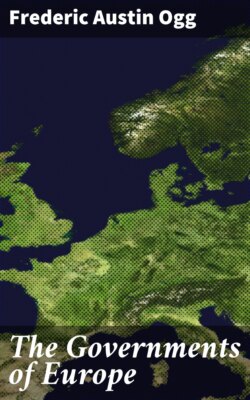Читать книгу The Governments of Europe - Frederic Austin Ogg - Страница 7
На сайте Литреса книга снята с продажи.
THE FOUNDATIONS OF THE CONSTITUTION I. The Importance of Historical Background
Оглавление1. Political Pre-eminence of Great Britain.—George III. is reported to have pronounced the English constitution the most perfect of human formations. One need hardly concur unreservedly in this dictum to be impressed with the propriety of beginning a survey of the governmental systems of modern Europe with an examination of the political principles, rules, and practices of contemporary Britain. The history of no other European nation, in the first place, exhibits a development of institutions so prolonged, so continuous, and so orderly. The governmental forms and agencies of no other state have been studied with larger interest or imitated with clearer effect. The public policy of no other organized body of men has been more influential in shaping the progress, social and economic as well as political, of the civilized world. For the American student, furthermore, the approach to the institutions of the European continent is likely to be rendered easier and more inviting if made by way of a body of institutions which lies at the root of much that is both American and continental. There are, it is true, not a few respects in which the governmental system of the United States to-day bears closer resemblance to that of France, Germany, Switzerland, or even Italy than to that of Great Britain. The relation, however, between the British and the American is one, in the main, of historical continuity, while that between the French or German and the American is one which arises largely from mere imitation or from accidental resemblance.
2. The Continuity of Institutional History.—No government can be studied adequately apart from the historical development which has made it what it is; and this ordinarily means the tracing of origins and of changes which stretch through a prolonged period of time. Men have sometimes imagined that they were creating a governmental system de novo, and it occasionally happens, as in France in 1791 and in Portugal in 1911, that a régime is instituted which has little apparent connection with the past. History demonstrates, however, in the first place, that such a régime is apt to perpetuate more of the old than is at the time supposed and, in the second place, that unless it is connected vitally with the old, the chances of its achieving stability or permanence are inconsiderable. In Germany, for example, if the institutions of the Empire were essentially new in 1871, the governmental systems of the several federated states, and of the towns and local districts, exhibited numerous elements which in origin were mediæval. In France, if central institutions, and even the political arrangements of the department and of the arrondissement, do not antedate the Revolution, the commune, in which the everyday political activity of the average citizen runs its course, stands essentially as it was in the age of Louis XIV.
If the element of continuity is thus important in the political system of Germany, France, or Switzerland, in that of England it is fundamental. It is not too much to say that the most striking aspect of English constitutional history is the continual preservation, in the teeth of inevitable changes, of a preponderating proportion of institutions that reach far into the past. "The great difficulty which presses on the student of the English constitution, regarded as a set of legal rules," observes a learned commentator, "is that he can never dissociate himself from history. There is hardly a rule which has not a long past, or which can be understood without some consideration of the circumstances under which it first came into being."[1] It is the purpose of the present volume to describe European governments as they to-day exist and operate. It will be necessary in all cases, however, to accord some consideration to the origins and growth of the political organs and practices which may be described. In respect to Great Britain this can mean nothing less than a survey, brief as may be, of a thousand years of history.
